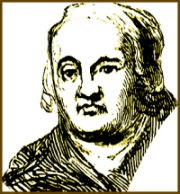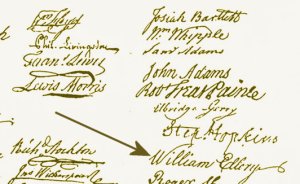|
William Ellery
William Ellery
was born in Newport, Rhode
Island on December 22, 1727
to William Ellery Sr. and Elizabeth
Almy. The Ellery's were originally from Bristol,
England. William Ellery's Great
Grandfather, William Ellery was born
in Bristol England in 1643
and emigrated to Glocester, Massachusetts
in 1662. William's father,
William Ellery Sr. was a noted Newport Merchant
and Slave Trader.
William was tutored at home
by his father before entering Harvard
at the age of 16 and graduating
in his twentieth year. He
returned to Newport in 1847
and tried his hand at several different commercial enterprises, settling
on none, but earning enough to support his family in a modest way.
William
married Ann Remington in 1850.
Ann died in 1864 and William
married Abigail Carey in 1867.
William had 7 children by Ann
and 8 children by Abigail.
(One of William and Abigail's sons, George
Wanton Ellery also served in the position of Collector for the Port of
Newport.) William's father
died in 1864 leaving him a
large inheritance and in 1870 he took up the practice
of law at the age of 43.
William was an
active member of the "Sons of Liberty"
and along with William Vernon
and Henry Marchant was a
leader in the "Stamp Act Riot"
of August 1765. Following the
death of Samuel Ward, he was elected as
his replacement to the Continental
Congress in 1776
and was one of the signers of the Declaration
of Independence. He served from 1776
to 1781 and again from
1783 to
1785. While serving in the Continental Congress, Ellery's
home and property
were destroyed by the British
during their occupation of Newport. In 1785
he joined the abolitionist movement
and was one of the leading advocates
of the abolition of slavery.
After
the War, Ellery was appointed as Chief
Justice of the Superior Court
of Rhode Island and in 1790,
he was appointed by President Washington
to the position of Collector of the Customs
for the Port of Newport,
which position he held until his death in 1820.
William
Ellery's active enforcement
of the laws against slave trading
infuriated the Rhode Island slave traders and in 1800, the slave trader John
Brown, who was elected to congress in 1799 sponsored
a bill to create a separate
district for Bristol. On February
23, 1800,
(pre-dating this
letter by one month) Congress created a separate
customs district for Bristol, Rhode Island. (Obviously
word of this appointment had not reached all parties yet, as it renders
the point of this letter moot.) The first collector for
Bristol was Jonathan Russell,
who continued to actively enforce the slave trading laws. This didn't
sit well with the D'Wolfs and the other slave trading families of
Bristol and they arranged through their connections and friendship with President
Jefferson for his removal and replacement by Charles
Collins in 1804.
This was certainly putting the Fox
in charge of the Hen House,
as Collins was formerly a captain
on D'Wolf Slave Ships.
NOTE:
In 1799 Ellery had the D'Wolf schooner Lucy, (Captain Charles Collins)
seized for engaging in the slave trade. The vessel was condemned and
placed at auction in Bristol. Ellery appointed the local surveyor,
Samuel Bosworth to bid on Lucy for the government. John Brown and
several other slavers at first attempted to persuade Bosworth to turn
down the assignment and when this didn't work, a gang hired by the
D'Wolfs and disguised as Indians kidnapped him and carried him in a
small boat several miles up the bay. The D'wolfs, than bought their
vessel back for a trifling amount.
William
Ellery died on February 20,
1820 in Newport,
Rhode Island while still serving as the Collector for Newport. He is
buried in the Common Burial Ground
on Farewell Street.
OLIVER
WALCOTT JR. Oliver
Wolcott Jr. was born in on January
11, 1760 in Litchfield,
Connecticut and was the
son of Oliver Walcott Sr., (signer
of the Declaration of Independence). He graduated from Yale
University in 1778
and was admitted to the bar in 1781.
He served as Auditor of the Treasury
from 1789 to 1791
and Comptroller from 1791
to 1795. He was a protégée
of Alexander Hamilton and
succeeded him as Secretary of the Treasury
in 1795. He was falsely
accused by the Republicans in 1800 of misappropriating
funds, (he was later cleared)
and resigned on December
31, 1800. He served as Governor
of Connecticut from 1817
to 1827.
Oliver
Walcott died on June
1, 1833 in New York City
and is interred at the
East Cemetery in Litchfield,
Connecticut. |
![]()


